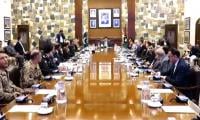KARACHI: Finance Minister Miftah Ismail on Saturday assured the businessmen that the government would settle Rs100 billion of tax refunds before of the end of its term.
Ismail, talking to textile exporters at the Pakistan Hosiery Manufacturers and Exporters Association house, said they would be paid Rs100 billion out of their total tax refunds before the term of the present Pakistan Muslim League (Nawaz) government comes to an end.
The minister, on rebate claims, said exporters would get money this month “and even more money next month”. “Your sales tax returns will not be more than Rs200 billion,” he remarked; although exporters claimed that alone their sales tax refunds amounted to more than Rs300 billion.
Ismail said it is difficult for any government to clear refunds altogether with deficit budgets.
The finance minister said Pakistan’s exports would reach $23 billion this year and government sets exports target of $28 billion for the next fiscal year. “If we give three percent rebate on exports, exports will reach around $70 billion,” he added.
Minister Ismail said every sector is demanding incentives, while taxes paid by all exporters barely reach Rs31 billion at a rate of 1.25 percent.
“Only cigarette companies pay more taxes than you,” he told the exporters.
The finance minister said business community in Karachi should imitate businessmen who set up Sialkot airport with their own resources.
The minister said the government plays safely with regards to rupee devaluation as the local currency has already been depreciated twice. “We have to get control of imports as well,” he added.
Ismail said removal of regulatory duties cost Rs12 billion to the government.
Earlier, Javed Bilwani, chairman of Pakistan Apparel Forum and Zubair Motiwala, former president of Karachi Chamber of Commerce and Industry, said the industry is facing liquidity crunch and if their issues are not immediately resolved, small exporters would be wiped out.
Bilwani advised the government to give them discounts in payment of utility bills till rebates and refunds are settled.
Meanwhile, Finance Minister, addressing brands award at the Federation of Pakistan Chambers of Commerce and Industry, said the government would present one-time tax amnesty bill before the parliament on Monday (tomorrow).
“It is a carefully-designed scheme and we will get all the relevant bills approved from the National Assembly on Monday,” he said.
“The committee formed by the chief justice to review the scheme has submitted a positive report.”
Minister Ismail, however, declined to explain the committee’s report. “I cannot say anything about the decision of chief justice in this regard,” he said. “The scheme would have positive effects on the economy.”
In April, government announced tax amnesty scheme, through presidential ordinances, to give residents one-off tax benefits for repatriating undeclared local liquid assets with a five percent penalty, undeclared foreign liquid assets with a two percent penalty (if repatriated, or a five percent penalty if remaining abroad or in foreign currencies), and undeclared fixed assets – whether held locally or abroad – with a three percent penalty.
The tax scheme targets increase in number of tax return filers from the miniscule 1.2 million. Of the total return filers, alone 700,000 paid taxes.
On businessmen’s demand of additional exemptions, Ismail said government has to comply with certain international laws and rules “so, there would be no exemptions in contradiction to the international laws”.
Businessmen said there is an uncertainty whether the scheme would be honoured by the next government.
They further informed the finance minister of certain anomalies in the Finance Bill 2018 and urged him to resolve issues facing trade and industry.
Ismail said the government has invited feedbacks of stakeholders to thoroughly discuss the anomalies.
“There are certain things, which need modification and we will do that,” he added. “But, the government would not withdraw any measure proposed to broaden the tax net and document the economy.”
Minister Ismail under-invoicing of imports is a major issue and the proposal to convert income tax at the import stage as minimum tax is aimed at curbing under-invoicing.
“Gross under-invoicing has been reported on imports from China and Chinese authorities are not willing to share trade data with us and therefore the measures have been proposed,” he added. “We can review the measures however.”
A representative image of footwear. — Reuters/FileLAHORE: The Pakistan Footwear Machinery & Material Show 2025,...
KARACHI: Faysal Bank Limited is set to actively support the State Bank of Pakistan’s Pakistan Financial Literacy...
Lucky Investment officials posing for photo after inauguration of their new office at the Finance and Trade Centre,...
EMB logo can be seen in EBM's Office. —Linkedin@EBM/FileKARACHI: English Biscuit Manufacturers , one of Pakistan’s...
This undated file photo shows processed gold bars. — AFP/FileKARACHI: Gold prices increased by Rs3,000 per tola on...
A cargo ship full of shipping containers is seen at the port of Oakland, as trade tensions escalate over US tariffs,...







